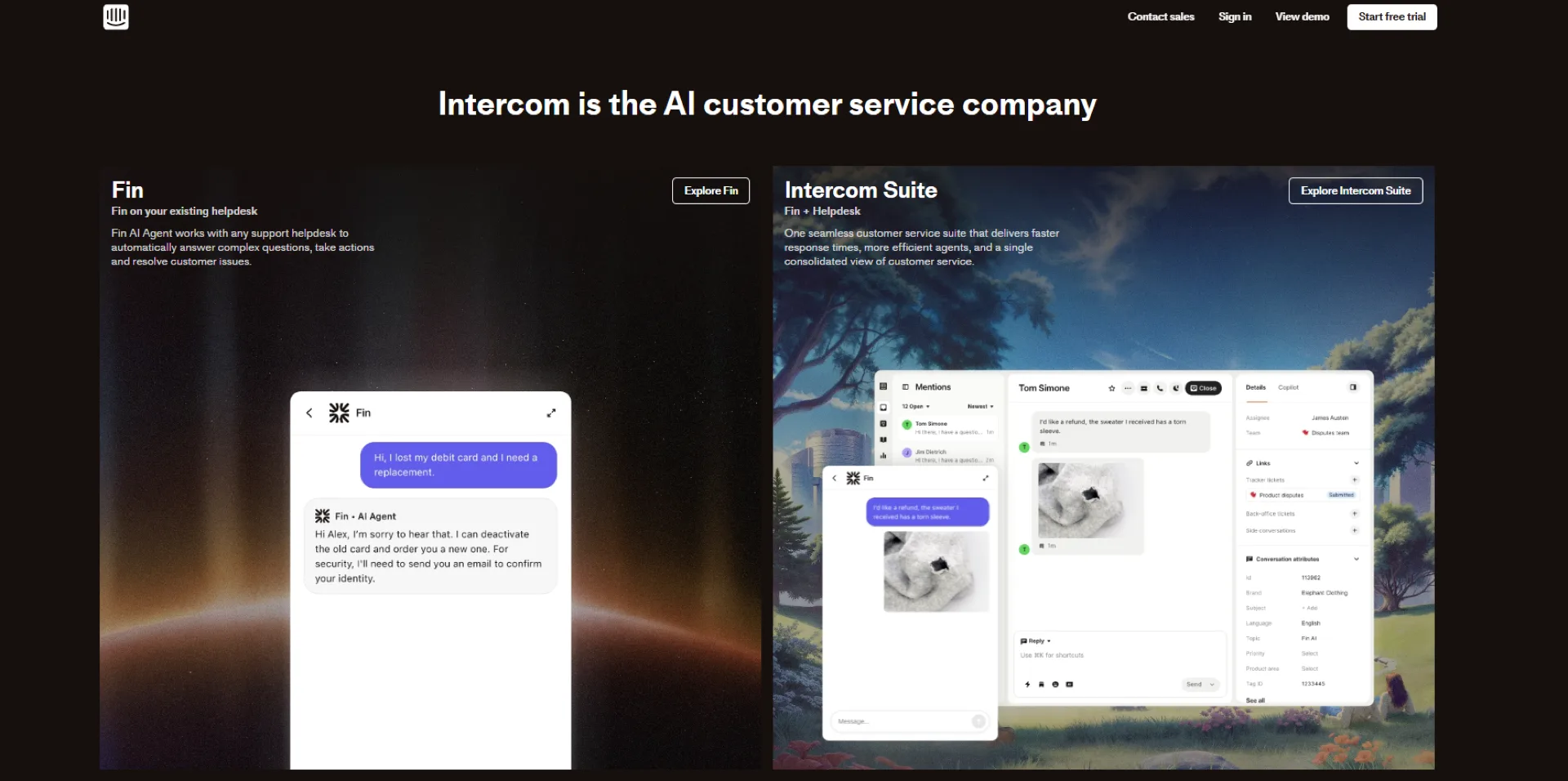
Intercom vs Zendesk: Which Support Platform Scales Better?

Choosing a customer support platform often comes down to evaluating practical trade-offs. Intercom and Zendesk are two of the most widely used options.
Intercom is centered on conversational messaging with some added ticketing functions. Zendesk is built around structured ticket management with broader support workflows.
Both tools serve important purposes, yet each comes with limitations that may affect how well they fit into your business.
In this guide, we’ll look at Intercom and Zendesk side by side, covering features, pricing, and usability. We’ll also highlight where a modern AI chatbot solution is designed to handle customer questions with AI, simplify setup, and reduce support workload.
What Is Intercom?#
Intercom is an AI-driven customer service platform that combines live chat, help desk ticketing, and automation. The platform has in-app messaging and chat capabilities via its Messenger tool.

Image Source: intercom.com
It offers a range of features like a shared inbox for support teams, a knowledge base for self-service, and AI chatbots (Fin) that can automatically answer customer questions.
Intercom also integrates with 450+ apps, which adds features for teams looking to connect workflows across two platforms or more.
What Is Zendesk?#
Zendesk is a customer support and help desk platform, known for its ticketing system and omnichannel support. It converts incoming customer requests from email, chat, phone, social media, and other channels into trackable tickets.
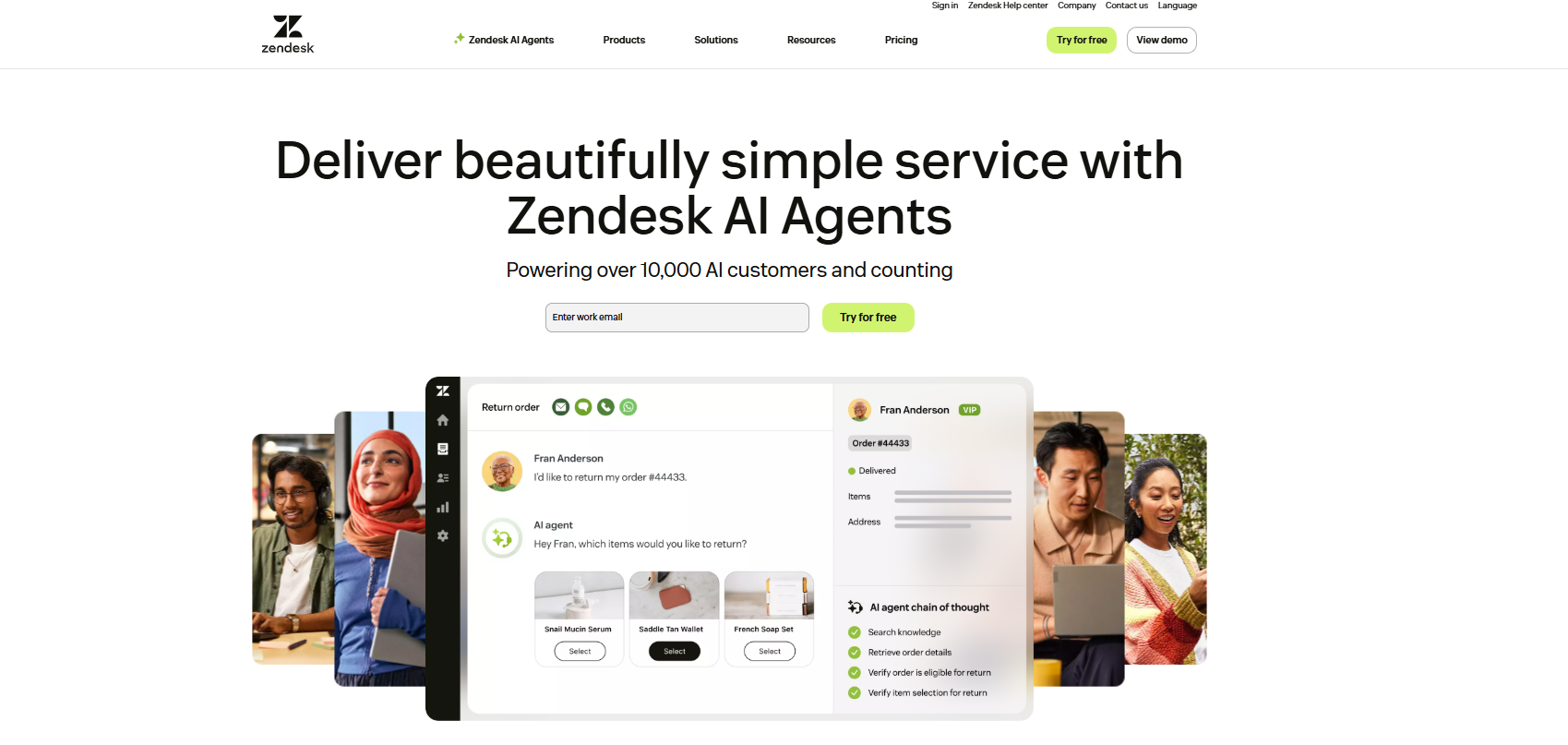
Image Source: zendesk.com
Zendesk's comprehensive knowledge base for self-service, community forums, live chat widget, and built-in voice calling ensures it can provide in-depth support.
What Is Denser?#
Denser is an AI-powered conversational support platform that takes a modern approach to customer assistance.
Unlike traditional helpdesks, it focuses on deploying intelligent AI agents that can interact with customers 24/7 and resolve queries using a company’s own knowledge and data.
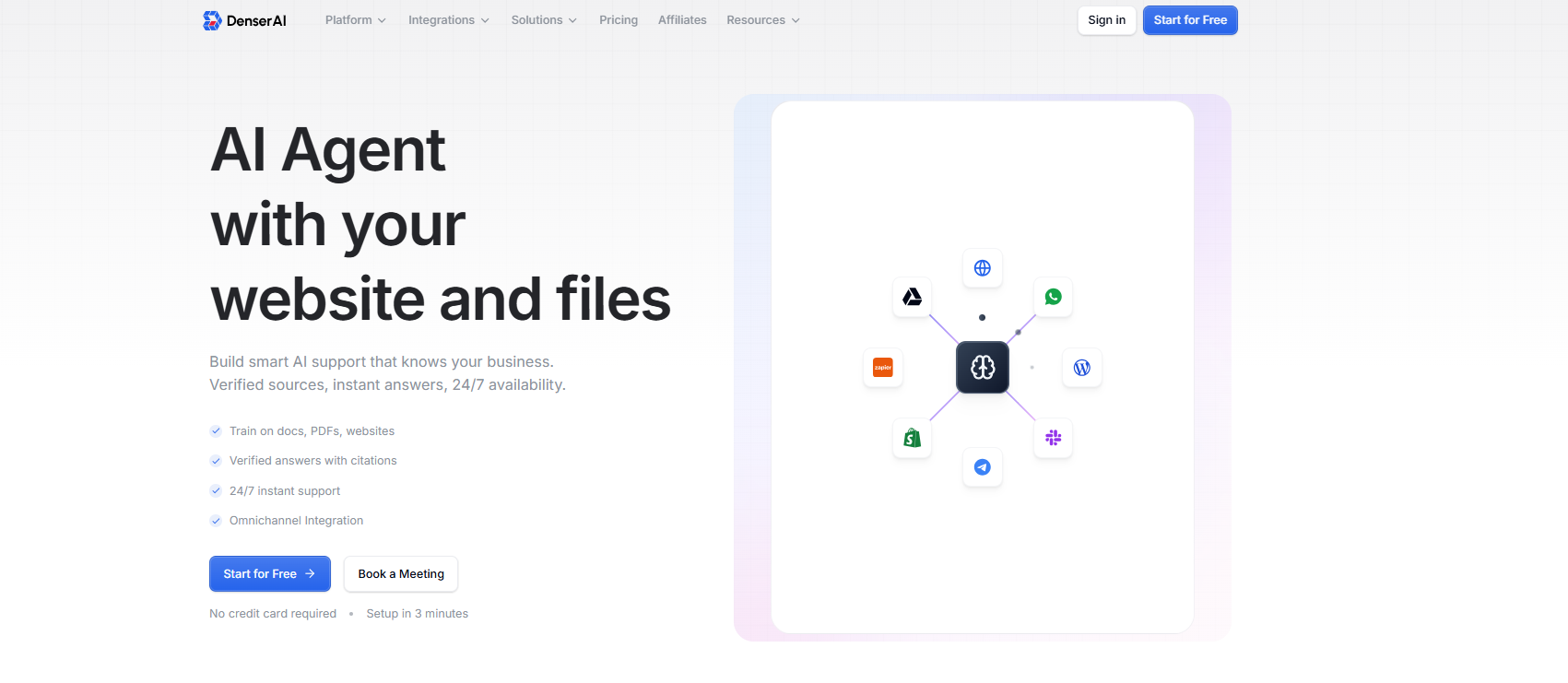
With Denser, you can quickly train an AI chatbot on your existing content. You can upload your product documents, and AI crawls your website. It can answer customer questions with verified information pulled from those sources.
Aside from web chat, Denser’s AI agent can be deployed across multiple channels to provide a consistent support experience. The platform offers a code-free setup that can be done in minutes and an intuitive bot builder that lets you customize the bot’s behavior and appearance.
If you want to prioritize fast, self-serve support and want to take advantage of the latest AI technology, Denser stands out as a top choice. Sign up for a free trial or schedule a demo with Denser today!
Intercom vs Zendesk vs Denser: Feature Comparison#
Each of these platforms takes a unique approach to customer support. Here’s a breakdown of the differences and how they work in the real world.
Ease of Use and Setup#
Intercom, being a SaaS, means you only need to sign up, and within an hour, you can have a live chat running on your site. It has also added advanced features like Tickets and SLAs that have made it closer to a full helpdesk, which naturally introduces some complexity.
Zendesk, with its ticketing capabilities and legacy as an enterprise tool, is generally considered more complex to set up and master than Intercom. Some elements require additional steps, such as the Answer Bot or AI tools, which need extensive configuration and training.
Denser Offers Quick, No-Code Setup#
Denser is designed with a strong focus on ease of setup and a user-friendly interface, especially given that it targets even non-technical users to create AI chatbots. You can deploy your no-code chatbot in minutes with no technical expertise required.
Indeed, the typical setup of Denser involves three simple steps:
- Import your data
- Customize your bot
- Deploy the bot by embedding a script or using an integration.
This is far simpler than configuring a full helpdesk or training a complex ML model from scratch.
Because Denser’s AI is pre-trained on language and then fine-tuned on your content, you don’t need to have AI expertise or manually create intents and utterances like some older chatbot platforms require.
Automation and AI#
Intercom has invested in AI automation capabilities in recent years to augment its support operations. Fin can automatically answer a large portion of customer inquiries by pulling information from your knowledge base and past answers.
Its AI Copilot suggests reply drafts or canned responses to help human agents work faster. It also includes a workflow builder that lets you set up rules and custom bots for specific tasks.
Zendesk has added AI and automation features to its suite as well, though some of them come as optional enhancements. It revolves around triggers, automations, and macros, where admins can configure rules or set up time-based escalations.
More recently, Zendesk AI and the Zendesk Copilot include AI-powered article recommendations, AI summarization of tickets, and new features such as advanced bots that can use custom models.
Denser Delivers Smarter AI With Verified Answers#
Denser uses semantic natural language understanding to interpret customer questions, rather than relying on keyword matches. It’s designed to handle the many ways a customer might ask the same question and still find the right solution.
Denser’s agent uses a large language model (LLM), combined with your specific knowledge base content, to generate helpful answers.
One of its standout features is that it can provide answers with context and citations, which adds transparency and reliability to the automated responses.
Live Chat and Messaging#
Intercom’s Messenger helps teams drive customer engagement with pop-up messages, product tours, and real-time chats. It supports live chat on web and mobile and targeted messaging through in-app notifications, email, and push alerts.
Zendesk offers live chat and messaging too, as part of its omnichannel platform. An agent can handle a chat conversation alongside emails, calls, or social messages in one consolidated interface.
The Zendesk Agent Workspace allows viewing the same ticketing page across multiple channels.
Denser Brings Real-Time Support#
Denser provides live chat functionality through its AI chatbot interface, which you can embed on your website or integrate with other messaging platforms. However, instead of a human agent responding in real time, the AI handles the conversation for instant replies.
From the end-user’s perspective, it’s a familiar chat widget where a customer can type a question and the Denser bot will reply instantly with an answer pulled from your knowledge sources.
The experience is available 24/7, giving proactive support that isn’t limited to business hours.
Customer Support and Ticketing#
Intercom includes a helpdesk-style inbox and a lightweight ticketing system, but its philosophy is more about messaging than managing historical data across multiple tickets.
Agents manage conversations in Intercom’s inbox, and issues can be marked as resolved, snoozed, or handled by setting auto responses to reduce repetitive work.
Zendesk has a more structured system that allows every request to be logged as a ticket that can be categorized, assigned, and tracked. It includes advanced reporting, escalation rules, and workflows to monitor customer support operations at scale.
Denser Handles Support Proactively#
Denser is an AI-powered customer support, handling customer queries in real time before they turn into support tickets. It doesn’t rely on a traditional ticketing interface but instead empowers its AI agent to respond on the spot using your documentation and data sources.
If the AI cannot resolve the issue or identify a high-priority problem, Denser offers seamless integration with your existing help desk. It can alert a human when human intervention is required to free your team to focus on higher-value tasks and help you nurture leads.
Knowledge Base and Self-Service#
Intercom includes a self-service knowledge base called the Help Center. It also has knowledge base chatbots, where if a customer asks a question in chat, the bot can pull an excerpt from relevant articles.
Zendesk’s knowledge base allows you to create a branded help center with multiple levels of content hierarchy, and it supports rich formatting, versioning, user feedback, and more.
The Answer Bot AI plugs into the knowledge base by automatically suggesting articles to deflect tickets.
Denser Delivers Smarter Self-Service With AI Retrieval#
Denser transforms your existing documents and webpages into a dynamic, conversational knowledge base.
Rather than manually crafting FAQs, you can upload or link your content, and Denser uses semantic AI to understand intent and retrieve the most relevant answers based on meaning.
This approach makes self-service smarter and faster. The AI bot provides instant, context-aware responses tailored to each query, which lessens common frustrations associated with static FAQ pages.
Integrations and Ecosystem#
Intercom offers a broad range of integrations through its App Store with over 450 pre-built apps. It has an API for building custom bots or integrations on your own.
Zendesk has an ecosystem with a Marketplace that features over 1,200–1,500 apps and integrations. The Zendesk API and Apps Framework also allow you to build features aligned with custom workflows inside the platform.
Denser Expands Support With Flexible API Access#
Denser is built to integrate into your existing workflows instead of replacing them. It offers a robust REST API that allows developers to query your AI agent programmatically.
Denser sends questions and retrieves responses for use in custom applications or automation workflows.
Beyond direct API integration, the platform also supports native connectors like Slack and Zapier. The Slack integration enables your chatbot to participate in Slack channels, responding to tickets and moving automatically through threaded conversations.
Analytics and Reporting#
Intercom provides a set of analytics and reporting tools geared towards monitoring support performance and customer interactions. You’ll find conversation volumes over time, median first response time, resolution time, and other key features for monitoring support.
Zendesk offers an analytics module called Zendesk Explore that comes with many pre-built dashboards for different aspects of your support operations. You can use a query builder to define metrics sliced by various attributes and filtered.
Denser Provides Actionable Insights From Every Query#
Denser gives you a detailed window into how your AI chatbot is performing. Through the Query Logs section in the Denser dashboard, you can track every user query alongside its response,
Queries are sorted by most recent and filterable by time period. Logs are retained for different durations depending on your plan and can be exported as CSV files for deeper analysis.
For growing businesses, this data provides practical insights that help refine support processes and knowledge base content.
Sign up for free or schedule a demo now!
Pricing Plans: Intercom vs Zendesk vs Denser#
Pricing plays a major role in how these platforms fit into a business long-term. Here’s a breakdown of how they compare.
Intercom Pricing#
Intercom’s pricing model is primarily per seat/user per month, with different plans and various add-on charges. Its customer service solution is divided into three plans:
- The **Essential **plan starts at $39/agent monthly and is aimed at small businesses. It includes the core features like the shared inbox, prebuilt reports, and a public help center.
- The **Advanced **plan costs $99/agent monthly and adds more capabilities such as multiple team inboxes, an advanced automation builder, and multilingual help centers.
- The **Expert **plan is $139/agent monthly, which further includes features like HIPAA support, service-level agreements (SLAs), and SSO needed by large teams.
It’s important to note that all Intercom plans include the Fin AI agent, billed at $0.99 per resolution with a minimum usage. These add-ons can contribute to hidden costs that increase as usage grows.
Zendesk Pricing#
Zendesk’s pricing is organized around two sets of plans: Support-only plans and Suite plans. Most new customers choose the Zendesk Suite, which has all the channels.
- The Support Team plan is the entry-level omnichannel bundle at $25/agent per month, including essential features like email, ticket routing, and support from the Zendesk team.
- The Suite Team is $69/agent monthly, which adds AI agents, a customizable AI persona, generative replies, one help center, and social messaging.
- The **Suite Professional **goes to $149/agent monthly and unlocks advanced capabilities, including advanced reporting, skills-based routing, HIPAA compliance, and five help centers.
- There is also a **Suite Enterprise **tier, which is priced at $219/agent monthly and comes with custom agent roles, audit logs, and contextual workspaces.
Beyond these base prices, Zendesk has add-ons too. If you want the Copilot features and you’re on a lower plan that doesn’t include them, you might add the Advanced AI add-on. There are also add-ons for additional generative AI tools and actionable insights.
Denser Pricing#
Instead of charging per support agent, Denser offers flat-rate plans based on usage limits, which can make it cost-effective if your AI bot handles a large volume of queries.
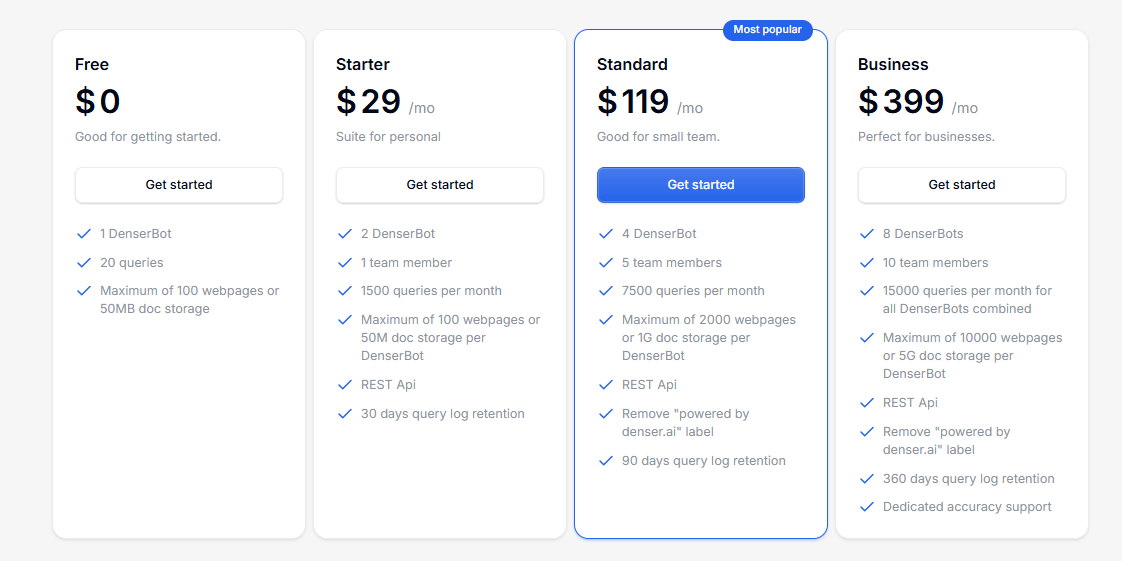
- The **Free **plan includes one AI chatbot, up to 20 queries per month, and a limited content storage of up to 100 webpages or 50 MB of documents. This is great for trial or small-scale use.
- The **Starter **plan is $29 per month and allows two bots, one team member, and up to 1,500 queries per month, with a higher content limit of 100 webpages or 50 MB per bot.
- The **Standard **plan at $119/month gives you four bots, five team members, and 7,500 queries per month, and raises the content allowance up to 2,000 webpages or 1 GB per bot.
- The **Business **plan at $399/month provides eight bots, ten team members, and 15,000 queries per month, with up to 10,000 webpages or 5 GB of docs per bot.
A big advantage of this model is predictable flat pricing. You’re not paying more just because you have more human agents, but rather based on how much the AI is used. AI-powered chatbots and automation are included, with no extra charges for other tools or integrations.
Denser scales as you grow, making sure you won’t be locked into unused customization options. This keeps costs transparent and avoids hidden costs common in agent-based pricing.
It also supports personalized support for customers by making the chatbot an extension of your brand. This results in a lower total cost compared to layered pricing from Zendesk/Intercom plans.
You can opt for annual billing to save 20% off all plans.
AI-First Platform That Fits Your Workflow—Choose Denser!#
Intercom is built around conversational messaging but only includes a light version of ticket management. Zendesk focuses on structured ticketing, yet its setup is more complex and often requires additional configuration to get started.
Denser removes these compromises by offering a modern, AI-first approach to customer support. Its core strength is combining automation with flexibility for consistent customer experiences.
The platform lets you deploy an AI chatbot in minutes that pulls answers from your existing content. Customers get accurate, citation-backed answers instantly, while your team benefits from reduced ticket volume and better insights into what people are asking.
If you’re deciding between Intercom and Zendesk, it’s worth considering whether either platform really matches the way customer support is changing.
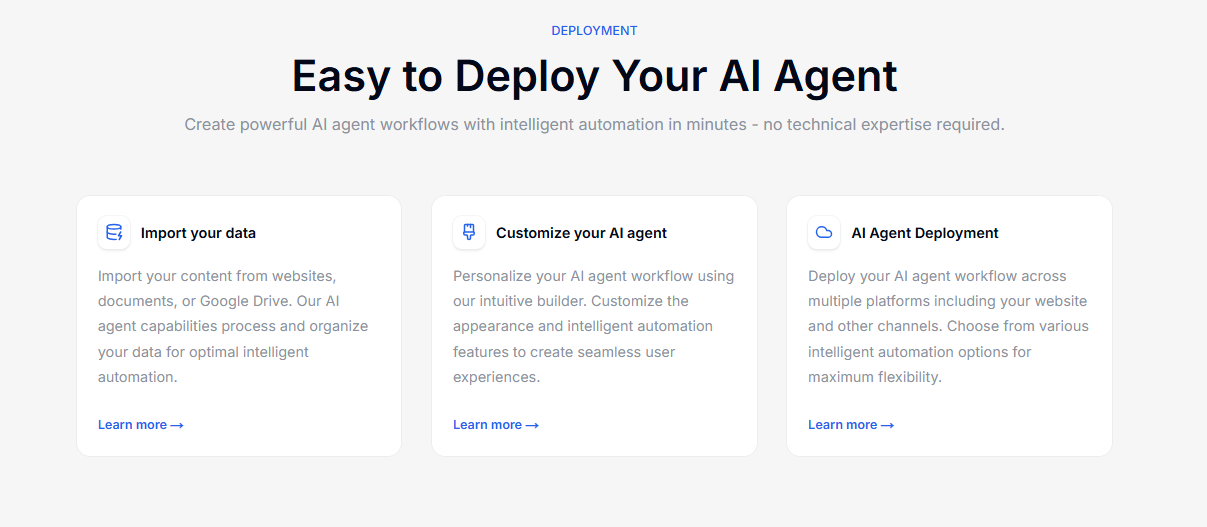
Sign up for a free trial or schedule a demo with Denser today!
FAQs About Intercom vs Zendesk#
Which is better, Zendesk or Intercom?#
Zendesk is used for an omnichannel ticketing system, robust workflows, and enterprise-grade infrastructure. Intercom, meanwhile, is known for proactive, conversational engagement with tools like Fin AI Copilot.
If your priority is real-time messaging and ways to improve engagement, Intercom may feel more modern and intuitive. Zendesk stands as an option for complex support setups that need structured processes, compliance, and reporting through custom reports.
Is Intercom a ticketing system?#
Yes, but only in a conversation-focused sense. Intercom includes tickets within its inbox experience, allowing teams to mark ongoing conversations as tickets for later follow-up.
Intercom's approach is centered on conversational support so that a single ticket may feel more like an ongoing thread than the lifecycle-driven tickets in systems like Zendesk.
While Intercom excels in simplicity, it lacks the depth of Zendesk’s enterprise workflows, such as tickets moving automatically through advanced routing rules.
What is better than Intercom?#
If you prioritize deep ticketing workflows, Zendesk or similar tools may be considered. But if your goal is automation with fewer manual steps, Denser stands out by combining AI capabilities with instant answers and seamless escalation.
Denser can pull from multiple sources, such as documents and webpages, and integrate with Microsoft Teams to deliver smarter responses.
Who is better than Zendesk?#
For conversational messaging, Intercom provides a simpler interface and AI features for outreach.
But if you're looking to stay ahead with automation, Denser provides AI-powered chatbots. They can deliver answers instantly and support auto responses or auto-closing tickets when configured.